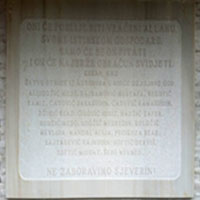25 years since the crime in Sjeverin It is our duty to remember and respect the victims of war crimes
On Sunday, October 22nd it will be exactly 25 years since the kidnapping and murder of 17 Serbian citizens of Bosniak ethnicity near Sjeverin, in the Priboj municipality. The Humanitarian Law Center (HLC) and the Sandzak Committee for the Protection of Human Rights and Freedoms (Sandzak Committee) reiterate that the Serbian authorities, even after 25 years, have not undertaken any action to fulfill their moral and legal obligations towards the victims’ families, neither in terms of finding the victims’ mortal remains, nor in providing a fair compensation.
On October 22nd 1992, members of the “Osvetnici” (Avengers), a paramilitary unit which operated under the auspices of the Republika Srpska Army, stopped a bus travelling from Rudo (in BiH) to Priboj (in Serbia). After checking the identity of every passenger, all Bosniaks were taken out of the bus and brought to Visegrad (BiH). After cruel torture, these captured civilians were killed. For this war crime against civilians, four members of the “Osvetnici” unit were convicted before the District Court in Belgrade in 2005.
The victims of this crime were: Mujo Alihodžić, Mustafa Bajramović, Ramiz Begović, Ramahudin Ćatović, Esad Džihić, Idriz Gibović, Zafer Hadžić, Medo Hodžić, Medredin Hodžić, Mevlida Koldžić (born Hodžić), Alija Mandal, Sead Pecikoza, Hajrudin Sajtarević, Derviš Softić, Mithad Softić and Mehmed Šebo; whilst on the night before the kidnapping from the bus in Sjeverin, Sabahudin Ćatović was also kidnapped. Up till today, the mortal remains of only one victim have been found, while the rest of the victims remain as missing persons.
In spite of declaratory statements from the highest government authorities, the making of any real efforts to find the bodies of these innocent victims has been completely neglecteded. In addition to ignoring the rights of victims’ families to know the truth about the fate of their closest relatives, the state of Serbia is consistently refusing to grant them reparations for their suffering and to recognize them as civilian victims of war, which would bring them modest but still important material support.
- A compensation lawsuit, filed in 2007, was rejected, with the legally unfounded explanation that Serbia’s responsibilities in this case were nonexistent, because the kidnapping itself occurred on the territory of Bosnia and Herzegovina. The families went to the European Court of Human Rights in September last year, where the proceedings are still pending.
- As with the court, the other authorities from the Republic of Serbia acted unlawfully when they rejected the members of the victims’ families requests for recognition of their status of civilian victims of war, arguing that the applicable Law on the Rights of Civilian Invalids of War does not apply to deaths that occurred outside the territory of Serbia, although such a provision does not exist in this Law. The key institution in implementing this Law – the Ministry of Labour, Employment, Veteran and Social Affairs – has ignored the
judgment of the Constitutional Court that such an interpretation of the law constitutes a violation of the applicants’ constitutional rights. The Ministry has also ignored the Constitutional Court’s order to render a fresh decision on the victims’ claims.
During the years of struggle for recognition of the rights of victims of war crimes, the HLC and the Sandžak Committee have witnessed the continuous ignoring and disregard of rights of the Sjeverin victims by the institutions of Serbia. A quarter of a century later, Serbia seems to be adding to the crimes once committed against the non-Serb population, which pushes those victims into complete oblivion. It is the duty of Serbia, as a state that claims to be a member of the community of European and democratic states, to decisively stand in the way of revisionist tendencies and finally take meaningful steps for the recognition and provision of fair reparations to all victims.








